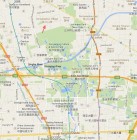See the earlier post here on my visit to the village: “Exploring the recycling villages of Beijing with Radio France”
https://blog.strategy4china.com/?p=5524
Most of Beijing’s vast, but mostly ignored, army of waste collectors and recyclers live in the village of Dongxiaokou, once a small farming community in the northern suburbs of the Chinese capital, just outside the Fifth Ring Road. See here the location and a picture of China Daily.
In the early years of this century, the village ceased to be an agricultural center, becoming instead Beijing’s – and arguably North China’s – biggest space for the storage and recycling of electronic waste. It is now being demolished by the authorities.
All the hectic building in the past years created vast amounts of construction and industrial waste – metal, wood and plastic – which the villagers purchased in bulk and sold to the little recycling factories that are scattered all over neighboring Hebei province.
The recyclers also bought from waste-collectors who stationed themselves outside numerous gated residential neighborhoods to offer meager sums for items the locals either no longer wanted or had no use for – ranging from empty bottles and old newspapers to used furniture and household appliances, and, almost inevitably, air conditioners.
They cleaned and repaired the ones in relatively good condition and then sold them, directly and through middlemen, to people who were keen to buy secondhand stuff at a customer-friendly price. Items beyond salvage were only valuable as raw materials. They probably ended up in those recycling factories, some transported by the freight trains that had previously carried coal and vegetables from Hebei to Beijing.
At its peak, through the collection, trading and recycling of waste, Dongxiaokou provided livelihoods for nearly 30,000 people.
The demolition of the village risks returning these people to their pre-Dongxiaokou days, when they roamed the city and found temporary refuge in unlikely places. The removal might be right due the environmental problems the village caused, because of the dust and the pollution from burning some of the waste. But these people are indispensable indeed as long as the government is not able to produce a viable alternative.
It is impractical to relocate operations outside the city boundaries because the increased transport costs would make the recycling businesses economically unviable.
Compared with the burning and burial of waste, now a common practice in Beijing, recycling has the obvious advantage of creating less pollution and saving natural resources.
See the original article China Daily “Saying goodbye to a life of grime”, dated 9 May 2014:
http://europe.chinadaily.com.cn/china/2014-05/09/content_17494974.htm

